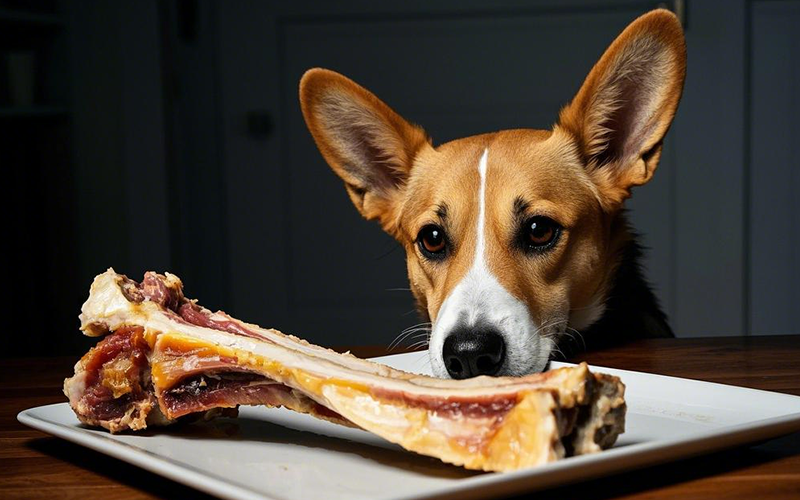Can Dogs Eat Rib Bones? The Dangers and Safety Concerns
- 6 Mar 2025 10:06
If you're considering giving your dog a rib bone, it’s essential to understand the risks involved. While many dogs enjoy chewing on bones, rib bones—particularly when cooked—pose serious dangers to your pet’s health. Before offering them to your dog, it’s crucial to weigh the potential hazards.
In this guide, we’ll cover:
✅ Why rib bones are dangerous for dogs
🚫 Health risks associated with rib bones
🐾 Safe alternatives for your dog to chew on

Why Are Rib Bones Dangerous for Dogs? 🚫
⚠️ Risk of Bone Splintering
Cooked rib bones are very brittle and can splinter easily.
When a bone splinters, it can break into sharp pieces that may pierce your dog’s mouth, throat, or digestive tract.
These sharp shards can cause internal bleeding, choking, or even life-threatening injuries.
⚠️ Choking Hazard
Rib bones, particularly smaller ones, can be a choking hazard for dogs.
If your dog chews off a piece that is too large to swallow, it could block their airway and cause choking.
⚠️ Risk of Intestinal Blockages
In addition to choking, swallowing large or sharp fragments of rib bones can lead to an intestinal blockage.
Blockages can be incredibly painful for your dog and often require surgery to remove the obstruction.
⚠️ Potential for Broken Teeth
Chewing on hard rib bones can cause broken or fractured teeth, especially for dogs that chew aggressively.
Dental injuries like cracked or broken teeth can lead to painful infections and the need for dental procedures.
Other Dangers of Rib Bones for Dogs 🚫
⚠️ Raw Rib Bones Can Carry Bacteria
Raw rib bones can be a source of harmful bacteria, such as Salmonella or E. coli, which can cause serious illness in both dogs and humans.
While some pet owners give raw bones to their dogs, it’s still important to be cautious and handle them properly to avoid contamination.
⚠️ Potential for Overeating and Weight Gain
Even if the bone itself doesn’t cause immediate harm, dogs can overeat if they are left alone with rib bones.
Excessive chewing or consumption of fatty meat around the bone can contribute to weight gain, which can lead to long-term health issues.
What Should You Do if Your Dog Eats a Rib Bone?
If your dog has consumed a rib bone, stay calm, but keep an eye on them for any signs of distress. Here’s what to do:
Monitor for symptoms – Look for signs of vomiting, diarrhea, abdominal bloating, pain, or excessive drooling.
Watch for choking – If your dog is coughing, gagging, or appears to be in respiratory distress, contact your vet immediately.
Visit the vet if necessary – If you notice any signs of blockage or your dog seems uncomfortable, it’s important to take them to a vet as soon as possible.
Safe Alternatives to Rib Bones for Dogs 🦴
While rib bones should be avoided, there are many other safe alternatives that your dog can enjoy. Here are a few options:
✔ Raw Meaty Bones (Non-Rib)
Raw bones from other animals, such as beef or lamb, can be a safer alternative.
These bones are less likely to splinter than cooked bones and provide your dog with a natural source of calcium and nutrients. However, always supervise your dog while they’re chewing.
✔ Rubber or Nylon Chew Toys
Rubber or nylon chew toys are designed to withstand aggressive chewers and are much safer than bones.
Many of these toys help keep your dog’s teeth clean and offer a satisfying chew experience without the risk of injury.
✔ Dental Chews
Dental chews are another great option for keeping your dog’s teeth clean while satisfying their urge to chew.
Many dental chews are designed to be digestible and come in various flavors to keep your dog entertained.
✔ Vegetables and Fruits
Carrots, apples, or sweet potatoes can provide a crunchy texture that is safe for your dog to chew.
Just be sure to remove seeds from fruits like apples, and cut the food into appropriate sizes to avoid choking.
Final Verdict: Can Dogs Eat Rib Bones?
🚫 No, dogs should not eat rib bones.
Cooked rib bones are highly dangerous due to their brittleness and tendency to splinter, posing serious risks such as choking, internal injuries, and blockages.
Even raw rib bones can carry bacteria and are not a safe option for your dog.
💡 Looking for advice on safe treats or chew toys for your dog? Try PettureX, the 24/7 AI pet assistant. It can provide helpful information and answer questions about what foods and toys are safe for your dog.
Want to explore more safe chewing options for your dog? Let me know! 🐶
Related

Can Dogs Eat Peaches? Vet Explains Benefits, Cyanide Risks & Safe Serving
- 16 Apr 2025
Can Dogs Eat Mulberries? Vet Explains Safety, Benefits & Potential Risks
- 16 Apr 2025
Can Dogs Eat Mozzarella? Vet Explains the Cheesy Truth (Risks & Benefits)
- 16 Apr 2025
Can Dogs Eat Maple Syrup? The Sugary Truth & Why Vets Advise Against It
- 16 Apr 2025
Can Dogs Eat Mango Skin? Vet Explains Why It's a Risky Chew!
- 16 Apr 2025
Can Dogs Eat Mac n Cheese? Vet Explains Why This Comfort Food Is Unsafe!
- 16 Apr 2025
Can Dogs Eat Liver? Vet Guide to This Nutrient-Dense Organ Meat (Benefits & Risks!)
- 16 Apr 2025
Can Dogs Eat Lamb? Vet Insights on This Nutritious Meat Option
- 16 Apr 2025
Can Dogs Eat Licorice? The Sweet Danger & Glycyrrhizin Risk Explained by Vets
- 16 Apr 2025
Can Dogs Eat Jelly? The Sweet Truth About Sugar, Xylitol & Why Vets Say No!
- 16 Apr 2025
